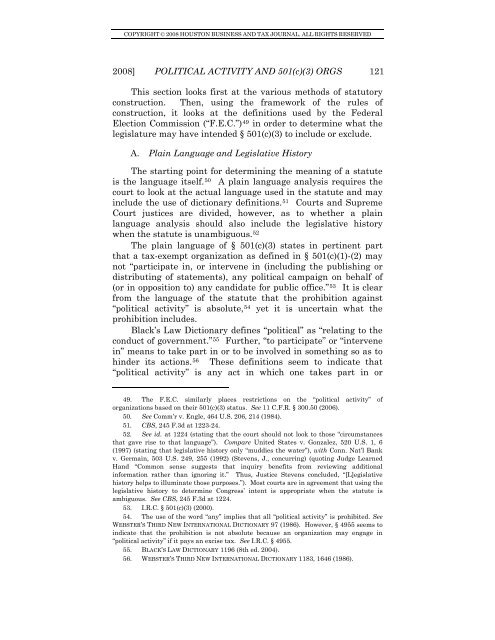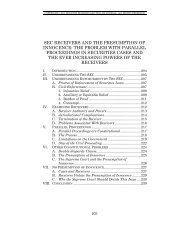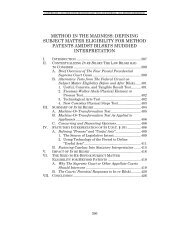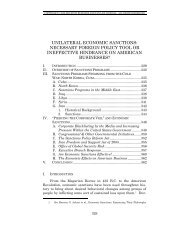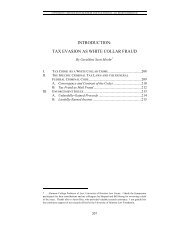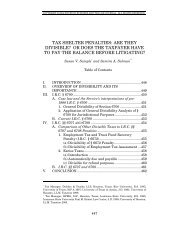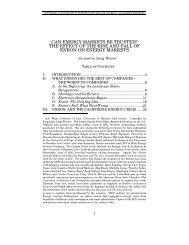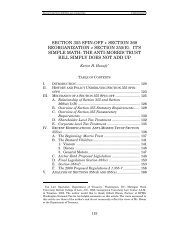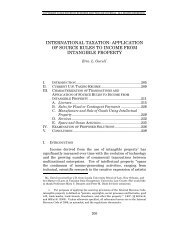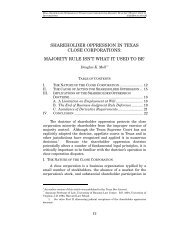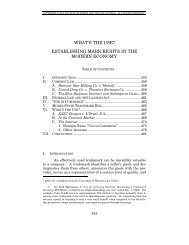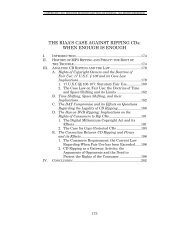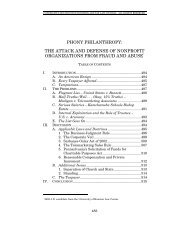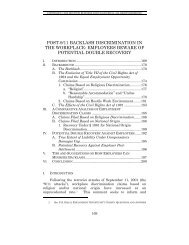Eyes Wide Shut: The Ambiguous ?Political Activity? - Houston ...
Eyes Wide Shut: The Ambiguous ?Political Activity? - Houston ...
Eyes Wide Shut: The Ambiguous ?Political Activity? - Houston ...
Create successful ePaper yourself
Turn your PDF publications into a flip-book with our unique Google optimized e-Paper software.
COPYRIGHT © 2008 HOUSTON BUSINESS AND TAX JOURNAL. ALL RIGHTS RESERVED<br />
2008] POLITICAL ACTIVITY AND 501(c)(3) ORGS 121<br />
This section looks first at the various methods of statutory<br />
construction. <strong>The</strong>n, using the framework of the rules of<br />
construction, it looks at the definitions used by the Federal<br />
Election Commission (“F.E.C.”) 49 in order to determine what the<br />
legislature may have intended § 501(c)(3) to include or exclude.<br />
A. Plain Language and Legislative History<br />
<strong>The</strong> starting point for determining the meaning of a statute<br />
is the language itself. 50 A plain language analysis requires the<br />
court to look at the actual language used in the statute and may<br />
include the use of dictionary definitions. 51 Courts and Supreme<br />
Court justices are divided, however, as to whether a plain<br />
language analysis should also include the legislative history<br />
when the statute is unambiguous. 52<br />
<strong>The</strong> plain language of § 501(c)(3) states in pertinent part<br />
that a tax-exempt organization as defined in § 501(c)(1)-(2) may<br />
not “participate in, or intervene in (including the publishing or<br />
distributing of statements), any political campaign on behalf of<br />
(or in opposition to) any candidate for public office.” 53 It is clear<br />
from the language of the statute that the prohibition against<br />
“political activity” is absolute, 54 yet it is uncertain what the<br />
prohibition includes.<br />
Black’s Law Dictionary defines “political” as “relating to the<br />
conduct of government.” 55 Further, “to participate” or “intervene<br />
in” means to take part in or to be involved in something so as to<br />
hinder its actions. 56 <strong>The</strong>se definitions seem to indicate that<br />
“political activity” is any act in which one takes part in or<br />
49. <strong>The</strong> F.E.C. similarly places restrictions on the “political activity” of<br />
organizations based on their 501(c)(3) status. See 11 C.F.R. § 300.50 (2006).<br />
50. See Comm’r v. Engle, 464 U.S. 206, 214 (1984).<br />
51. CBS, 245 F.3d at 1223-24.<br />
52. See id. at 1224 (stating that the court should not look to those “circumstances<br />
that gave rise to that language”). Compare United States v. Gonzalez, 520 U.S. 1, 6<br />
(1997) (stating that legislative history only “muddies the water”), with Conn. Nat’l Bank<br />
v. Germain, 503 U.S. 249, 255 (1992) (Stevens, J., concurring) (quoting Judge Learned<br />
Hand “Common sense suggests that inquiry benefits from reviewing additional<br />
information rather than ignoring it.” Thus, Justice Stevens concluded, “[L]egislative<br />
history helps to illuminate those purposes.”). Most courts are in agreement that using the<br />
legislative history to determine Congress’ intent is appropriate when the statute is<br />
ambiguous. See CBS, 245 F.3d at 1224.<br />
53. I.R.C. § 501(c)(3) (2000).<br />
54. <strong>The</strong> use of the word “any” implies that all “political activity” is prohibited. See<br />
WEBSTER’S THIRD NEW INTERNATIONAL DICTIONARY 97 (1986). However, § 4955 seems to<br />
indicate that the prohibition is not absolute because an organization may engage in<br />
“political activity” if it pays an excise tax. See I.R.C. § 4955.<br />
55. BLACK’S LAW DICTIONARY 1196 (8th ed. 2004).<br />
56. WEBSTER’S THIRD NEW INTERNATIONAL DICTIONARY 1183, 1646 (1986).


